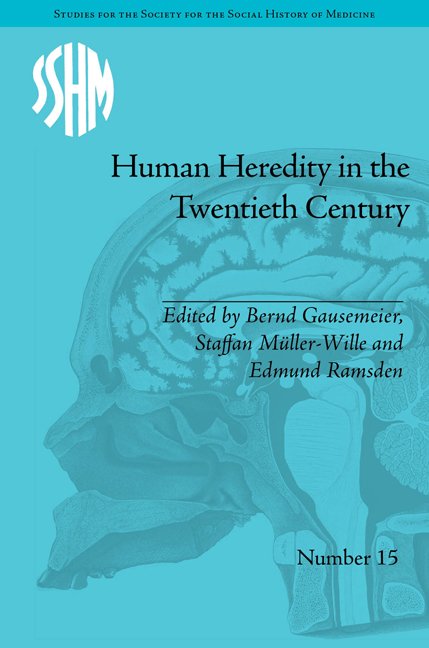Book contents
- Frontmatter
- Contents
- Acknowledgements
- List of Contributors
- List of Figures and Tables
- Introduction: Human Heredity in the Twentieth Century
- Part I Constructing Surveys of Heredity
- Part II Blood and Populations
- Part III Human Heredity in the Laboratory
- Part IV Understanding and Managing Disease
- Part V Reconstructing Discipline(s)
- 14 The Emergence of Genetic Counselling in the Federal Republic of Germany: Continuity and Change in the Narratives of Human Geneticists, c. 1968–80
- 15 Performing Anger: H. J. Muller, James V. Neel and Radiation Risk
- 16 The Struggle for Authority over Italian Genetics: The Ninth International Congress of Genetics in Bellagio, 1948–53
- Notes
- Index
15 - Performing Anger: H. J. Muller, James V. Neel and Radiation Risk
from Part V - Reconstructing Discipline(s)
- Frontmatter
- Contents
- Acknowledgements
- List of Contributors
- List of Figures and Tables
- Introduction: Human Heredity in the Twentieth Century
- Part I Constructing Surveys of Heredity
- Part II Blood and Populations
- Part III Human Heredity in the Laboratory
- Part IV Understanding and Managing Disease
- Part V Reconstructing Discipline(s)
- 14 The Emergence of Genetic Counselling in the Federal Republic of Germany: Continuity and Change in the Narratives of Human Geneticists, c. 1968–80
- 15 Performing Anger: H. J. Muller, James V. Neel and Radiation Risk
- 16 The Struggle for Authority over Italian Genetics: The Ninth International Congress of Genetics in Bellagio, 1948–53
- Notes
- Index
Summary
How did expert engagement with the security state shape quotidian professional scientific practice? In this essay, I explore a dispute in 1956 between two prominent geneticists in the United States about the proper way to apply results with Drosophila to human radiation risk. The disagreement ended with a hastily called summit meeting at Oak Ridge National Laboratory, but the views of the two key geneticists involved did not change much. Human geneticist James V. Neel (1915–2000) continued to believe that radiation risk could only be assessed through studies of human populations, and Drosophilist Herman J. Muller (1890–1967) continued to argue that results with Drosophila suggested alarming risks to people all over the world. The dispute itself is only one of many about radiation risk and certainly not even the most important one – though I do think that historians have been insufficiently interested in general in the logic of extrapolation across species. But I suggest here that this single argument provides a way to begin to explore the roles of anger as professional practice in mid-century genetics, and by implication in technical networks in general. The evolutionary biologist Ernst Mayr, observing a different dispute between H. J. Muller and Theodosius Dobzhansky, once asked ‘what makes the geneticists such a bunch of emotional prima donnas?’
- Type
- Chapter
- Information
- Human Heredity in the Twentieth Century , pp. 205 - 216Publisher: Pickering & ChattoFirst published in: 2014



